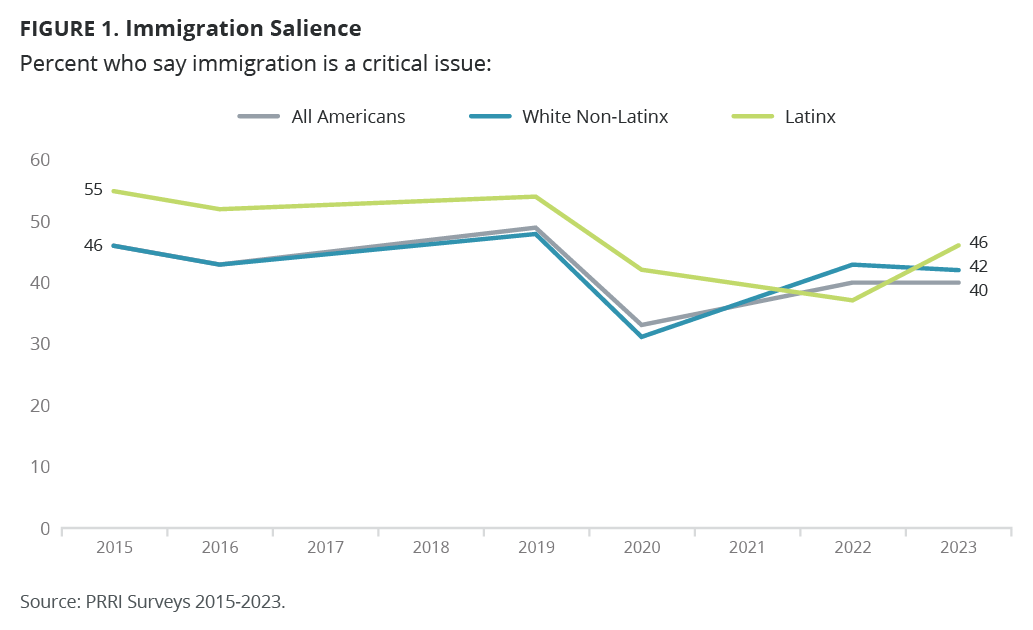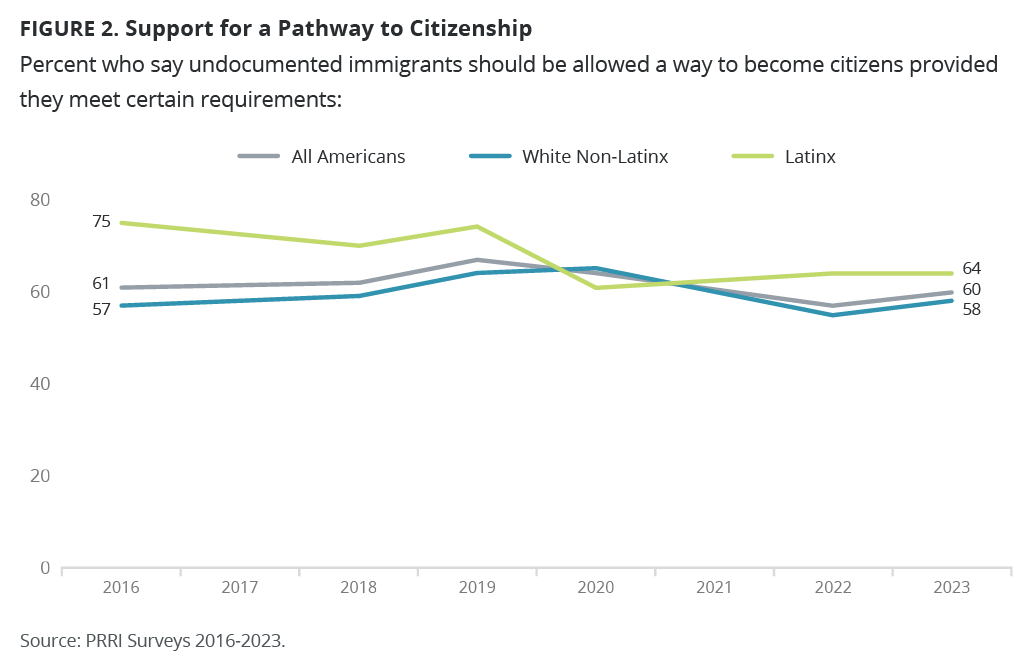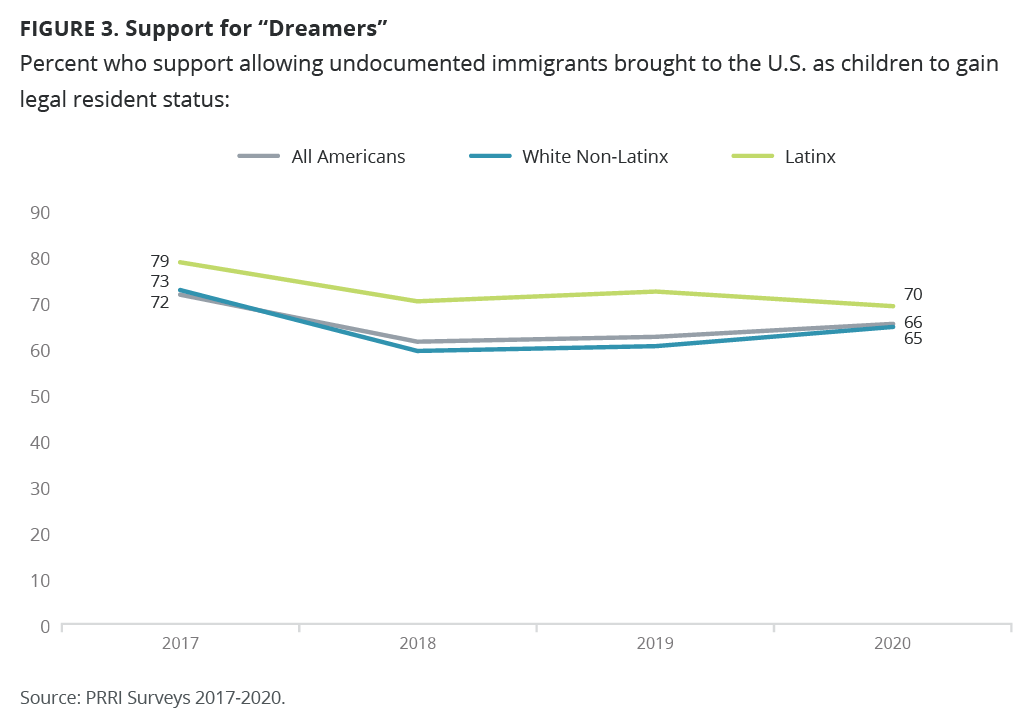Latinx Support for a Pathway to Citizenship for Undocumented Immigrants Remains Strong (for Now)

Thirty-seven years ago, President Ronald Reagan signed into law the Immigration Reform and Control Act (IRCA). Although it is most often remembered for providing amnesty and legal status to an estimated 3 million undocumented immigrants (the majority of whom were of Latinx descent), it also increased border security resources, restricted access to federal financial assistance for legalized immigrants, and created an employment verification system. Additionally, it created civil and criminal penalties for those who knowingly hire individuals who are not authorized to work in the United States.
Since the passage of this landmark reform, there has been no shortage of criticism from either side of the immigration debate. For some, inadequate enforcement mechanisms and the dramatic growth of the undocumented population provides proof that amnesty is doomed to failure. Others point to inherent flaws, not in the concept of amnesty, but in parts of the act and its implementation, including the exclusion of millions from this program in 1986, the inadequate legalization channels for future migrants, and inhumane treatment of migrants at the hands of the U.S. Border Patrol.
Because immigration policies disproportionately impact Latinx communities, it is not surprising that the Latinx electorate has been, and remains, the most ardent group supportive of an IRCA-style pathway to citizenship. However, an analysis of PRRI’s 2015-2023 survey data reveals that Latinx support for such policies has declined significantly over this time period, suggesting that this critical base of support may be hollowing out.
Latinx, like other Americans, are not single-issue voters and typically regard the economy, crime, and healthcare as more important issues in the lead-up to elections, compared with immigration. Nevertheless, because anti-immigrant rhetoric and policies are often viewed as implicit (and sometimes explicit) attacks against Latinx communities, the salience of this issue has historically been higher among Latinx than among non-Latinx Americans.
This was certainly the case between 2015 and 2020 when significantly higher percentages of Latinx characterized immigration as a “critical issue” compared with white non-Latinx Americans. While the salience of this issue declined among Latinx and non-Latinx populations during that time period as other issues rose in prominence (e.g. coronavirus), the rate of decline was particularly stark among the Latinx population. Fifty-five percent of Latinx Americans regarded immigration as a critical issue in 2015 compared with only 37% in 2022. This 18 percentage-point decline dwarfs what we see in Figure 1 among non-Latinx white Americans. Although the salience of immigration among Latinx Americans rebounded to 46% in 2023, the broader trend line seems to suggest that we are past the days when the majority of Latinx voters would regard this as a critical issue.

Figure 2 depicts Latinx and white non-Latinx support for an IRCA-style pathway to citizenship from 2016 to 2023 and reveals several interesting and counter-intuitive comparisons. First, despite increasingly hostile rhetoric against undocumented immigrants over the last decade, the majority of both Latinx and non-Latinx Americans support a pathway to citizenship for undocumented immigrants. As might be expected, Latinx support, on average, exceeded white non-Latinx support; at 8.3% across this time period. [1] Interestingly, we can see that white non-Latinx support steadily increased from 2016 (57%) to 2020 (65%) before declining precipitously in 2022 (55%) and rebounding a bit in 2023 (58%). Conversely, Latinx support declined 14 percentage points between 2016 (75%) and 2020 (61%) before stabilizing at 64% in 2022 and 2023. Although it might be tempting to write off the 13 percentage-point decline in Latinx support between 2019 and 2020 as an outlier or a function of the 2020 coronavirus pandemic dynamics, the fact that support only increased by 3 percentage points two years later and held steady in 2023 suggests that a broader trend may be at work here.

Similar dynamics emerge when examining Figure 3, which depicts support for providing legal status to undocumented children who were brought to the U.S. (e.g. “Dreamers”). These policies have remained wildly popular among all Americans with support never falling below 60% between 2017 and 2020. As was the case with an IRCA-style pathway to citizenship, Latinx support exceeds white non-Latinx support by an average of over eight percentage points over this time period. However, in contrast to the previous analysis, white non-Latinx support declined 13 percentage points between 2017 and 2018 (from 73% to 60%) before rebounding to 65% in 2020. By comparison, Latinx support declined 8 percentage points between 2017 (79%) and 2018 (71%), then inched up a couple of points in 2019 (73%) and settled at 70% in 2020.

What does this data tell us? While immigration has historically been regarded as a critical issue for the majority of the Latinx electorate, that has not been the case since 2020. Although strong majorities of Latinx continue to support an IRCA pathway to citizenship and over two-thirds support legal status for “Dreamers,” there is an unmistakable decline in the strength of that support. Latinx Americans are not a monolith and there has always been a sizable minority who support more restrictive immigration policies and the politicians who espouse them. Yet, the question remains: why might this minority be growing?
Although definitively answering that question goes beyond the scope of the data available here, my ongoing research suggests that a growing number of Latinx are exhibiting “Latinx Immigrant Resentment.” In forthcoming publications, my coauthors and I theorize that such individuals harbor discredited negative stereotypes about immigrants (e.g. criminality, economic threats) and blame Latinx immigrants for giving the non-immigrant Latinx community a bad name. Rather than viewing restrictive immigration policies or rhetoric as a threat to the broader Latinx community, they embrace it as a means of punishing the “black sheep” of the Latinx community and/or signaling to non-Latinx Americans that there is a meaningful distinction between immigrant and non-immigrant Latinx. Our research suggests that the percentage of Latinx adopting this perspective is increasing and is significantly associated with support for restrictive immigration policies.
In the 37 years since the IRCA was signed, the U.S. has vacillated between piecemeal reforms and congressional paralysis; immigration rhetoric has become more impassioned and polarizing. The sort of grand bargain achieved in 1986 failed in 2013 and further attempts seem now impossible to achieve in contemporary American politics. While it may be reassuring to see that support for an IRCA- style pathway to citizenship remains alive and well among the electorate, any sense of relief should be tempered by the hollowing out of Latinx support. Advocates of reforms would do well to take note of these dynamics and strategize how they can best move forward in this changing reality.
[1] Differences between white non-Latinx and Latinx are not statistically significant in 2020.

